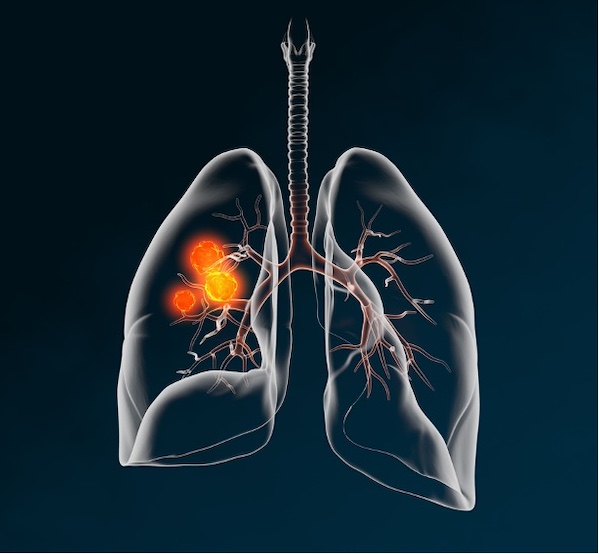Merck and Moderna to Launch Trial of mRNA-4157 Plus Keytruda in Non-Small Cell Lung Cancer
December 13, 2023
Source: drugdu
 255
255
Pharmaceutical Executive Editorial Staff
Phase III trial to investigate novel individualized neoantigen therapy V940 (mRNA-4157) in combination with Keytruda (pembrolizumab) as an adjuvant treatment for patients with completely resected Stage II, IIIA, or IIIB non-small cell lung cancer.
 Image credit: Axel Kock | stock.adobe.com
Image credit: Axel Kock | stock.adobe.com
Merck and Moderna, Inc., have announced plans to launch the pivotal Phase III INTerpath-002 (NCT06077760) clinical trial of the novel individualized neoantigen therapy V940 (mRNA-4157) in combination with Keytruda (pembrolizumab) as an adjuvant treatment for patients with completely resected Stage II, IIIA, or IIIB non-small cell lung cancer (NSCLC). V940 is comprised of synthetic mRNA coding for up to 34 neoantigens that are designed and produced based on the unique mutational signature of a patient’s tumor. After administration of the drug, the algorithmically derived and RNA-encoded neoantigen sequences are endogenously translated and undergo natural cellular antigen processing and presentation.
“As lung cancer is the leading cause of cancer death worldwide, there is a need for continued scientific advancements to help fight this disease at earlier stages when patients have the best chance for better outcomes,” said Marjorie Green, MD, senior vice president and head of late-stage oncology, global clinical development, Merck Research Laboratories, in a press release. “By combining Keytruda with V940 (mRNA-4157), a promising new modality, we are researching innovative new approaches for earlier stage non-small cell lung cancer.”
The global, randomized, double-blind, placebo- and active comparator-controlled INTerpath-002 trial is analyzing 868 patients with completely resected Stage II, IIIA or IIIB [N2] NSCLC. After undergoing a complete surgical resection and adjuvant chemotherapy, patients 18 years of age and older will be randomly assigned 1:1 to receive V940 at a dose of 1 mg every three weeks for up to nine doses and Keytruda at a dose of 400 mg every six weeks for up to nine cycles compared with Keytruda monotherapy for approximately one year or until disease recurrence or other criteria to discontinue study intervention are hit.
The trial’s primary endpoint is disease-free survival (DFS), which is defined as the time from randomization to recurrence or new primary disease identified by investigator assessment or death due to any cause. The secondary endpoints are overall survival, distant metastasis-free survival, lung cancer-specific survival, safety, and quality of life.
Enrollment criteria for INTerpath-002 require completion of surgical resection of histologically confirmed Stage II, IIIA or IIIB (N2) squamous or nonsquamous NSCLC, confirmation that epidermal growth factor receptor-directed therapy is not indicated as primary therapy, no evidence of disease when documented consent for the main study is provided, previous treatment with at least one dose of adjuvant therapy with standard-of-care platinum-based doublet chemotherapy for up to four cycles, and no more than 24 weeks between surgical resection with curative intent and the first dose of Keytruda.
Keytruda is an anti-programed death receptor-1 (PD-1) therapy that improves the immune system's ability to detect and fight tumor cells. The humanized monoclonal antibody blocks the interaction between PD-1 and its ligands, PD-L1 and PD-L2, which leads to the activation of T lymphocytes that could affect tumor and healthy cells.
To date, more than 1600 trials are evaluating Keytruda across a range of cancer types and treatment settings. Keytruda also has approved indications in melanoma; non-small cell lung cancer; head and neck squamous cell cancer; classical Hodgkin lymphoma; primary mediastinal large B-cell lymphoma; urothelial carcinoma; gastric cancer; microsatellite instability-high or mismatch repair deficient cancer; microsatellite instability-high or mismatch repair deficient colorectal cancer; esophageal cancer; cervical cancer; hepatocellular carcinoma; Merkel cell carcinoma; renal cell carcinoma; endometrial carcinoma; tumor mutational burden-high cancer; cutaneous squamous cell carcinoma; and triple-negative breast cancer.
Beyond INTerpath-002, the treatment combination is also being evaluated in the global, randomized, double-blind, placebo- and active-comparator-controlled Phase 3 INTerpath-001, trial (NCT05933577) among 1,089 patients with resected Stage IIB-IV melanoma.
INTerpath-001 is actively screening in 38 sites across 14 countries: Australia, Belgium, Canada, Chile, France, Germany, Greece, Israel, Italy, Poland, Portugal, Spain, Turkey, and the United Kingdom.
Global recruitment for INTerpath-002 is underway with the first patients enrolled in Australia. In the press release, Merck and Moderna announced plans to continue expanding the comprehensive clinical development program for V940 to additional tumor types.
“Addressing lung cancer reflects the constant struggle between medical innovation and biological complexity. Each patient's cancer presents a labyrinth of genetic mutations, driving a novel approach of individualized medicines manufactured based on the distinct molecular tumor profile for each patient,” said Kyle Holen, MD, Moderna senior vice president and head of Development, Therapeutics and Oncology, said in a press release. “We believe an individualized neoantigen therapy can be this catalyst for innovation and drive us forward towards the next frontier of cancer care. I’m incredibly thankful for the patients, investigators, and clinical trial sites for helping us in this mission.”
By editorRead more on
- The first subject has been dosed in the Phase I clinical trial of Yuandong Bio’s EP-0210 monoclonal antibody injection. February 10, 2026
- Clinical trial of recombinant herpes zoster ZFA01 adjuvant vaccine (CHO cells) approved February 10, 2026
- Heyu Pharmaceuticals’ FGFR4 inhibitor ipagoglottinib has received Fast Track designation from the FDA for the treatment of advanced HCC patients with FGF19 overexpression who have been treated with ICIs and mTKIs. February 10, 2026
- Sanofi’s “Rilzabrutinib” has been recognized as a Breakthrough Therapy in the United States and an Orphan Drug in Japan, and has applied for marketing approval in China. February 10, 2026
- Domestically developed blockbuster ADC approved for new indication February 10, 2026
your submission has already been received.
OK
Subscribe
Please enter a valid Email address!
Submit
The most relevant industry news & insight will be sent to you every two weeks.



